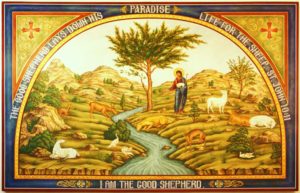17 March OS 2018: Friday of the Sixth Week of Lent; S. Alexis the Man of God; S. Patrick Enlightener of Ireland, Bishop
The first reading at Vespers today is the conclusion of the book of Genesis, 49:33-50:26.
Joseph keeps faith with his father and buries him on his own land, not foreign soil. In his old age, he adjures the sons of Israel to do the same for his bones when at length the Lord, the God of their fathers, delivers them from Egyptian bondage and leads them back home. This return provides an image of man’s return to Paradise, his true home.
Each human heart longs for home. To the extent the heart does not, to that extent it is become inhuman. “Cosmopolitan man” is a contradiction in terms. Say rather “cosmopolitan monster.” To love one’s own – one’s flesh and blood kith and kin, native soil, native language, native culture – is bedrock for psychological health, a pre-condition for the sane life. That our planetary rulers have decreed this love a crime shows plainly that they intend to drive us mad.
Exile, says S. John of the Ladder, is the mother of mourning, and mourning the mother of repentance. God wants us to love home, family, and people intensely, insatiably, to the point at which losing them hurts so much that we feel we will die without them, for only at this point does one realize that one actually needs God. Just as mercy does not exist unless justice exists, so exile does not exist unless home exists. Christians are not universalists, not cosmopolitans: when they lose that which is native to them, they mourn and weep. The Apostles were not sent out to baptize the atomized individuals of a postmodern dystopia. They baptized the nations.
Today we stand on the brink. We are about to lose everything visible that makes life worthwhile. Nation, family, native place, native tongue, native loves – all are being swept away by the demon-chiefs of this age and their lickspittle lackeys, the global elite. Let us rejoice then, and be glad, for exile is thereby abundantly available to us, having become the common setting for human existence. In the divine Providence, as Joseph explains today to his worried brothers, all is arranged perfectly for our salvation. Today only the life of the Church remains, and that not in the splendid cathedrals and ancient sees, but in nooks and crannies, in the dens and caves of the earth. But ultimately the Church is all we need, because, ultimately, God is all we need. When a man dies, there is only his soul standing before God, and he realizes, finally, that this was in fact the case all along.
At the end of our Genesis journey through Great Lent, then, we have come back to where we started, back to Paradise, back to our true home, which no one can take away from us. In the next life, this will take place openly; in this life it takes place mystically, every day, in an Orthodox heart prepared by sorrows and pierced by compunction. When we know with all the powers of our soul, with our whole being, without a doubt, that our heart is larger than all this world, because it holds the Trinity, then, at last, we have come home.

